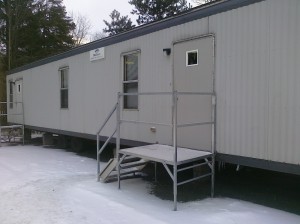
A few short impressions from 2.5 days of work:
- The drive sucks. It’s about an hour and forty minutes each way, and today it was snowing so it was a bit longer. I’m going through a tank full of gas every two days, which even with a Prius seems expensive. They told me in the interview I’ll be able to start working from home soon, so I’ve got to get that set up.
- The construction trailer I work in sucks. I sit next to the door, and it’s cold and drafty, even when people remember to close it behind them. Right behind me is a meeting room with paper thin walls where everybody uses the speaker phone. Worse still, the heater outlet is there so most times when the meeting is on, people turn off the heater. If we’re lucky, they remember to turn it back on afterwards, but yesterday we didn’t discover that nobody had turned on the heater until my toes were about to drop off.
- My computer has two screens. I had two big screens when I was at Kodak, and I’d forgotten how useful that is when you’re programming to be able to devote an entire screen to Eclipse while you used the other window for running the app, as well as other web browsing and the like. As soon as I have my first paycheck, I think I’m going to buy a cheap LCD panel for my home office.
- The pace is hectic. My supervisor never has time to show me anything, but he’s expecting results immediately. That can be frustrating. On the other hand, it’s good to have something to do and a project where things actually happen.
- They wrote their own web framework. As if the world doesn’t have enough Java web frameworks, they wrote their own. And it has its good points and bad points. Each page starts with an XML page description document and an XSLT document. But it’s not what you think – the XSLT document doesn’t process that page description document. Instead, the page description document specifies the Java beans that either produce or consume nodes in a different XML document, which the XSLT document then processes into an HTML page. The forward and back buttons on the browser don’t work on many of their pages, for reasons I don’t entirely understand yet. They use Javascript a lot. I’m going to come out of here with a lot of experience in XSLT and JQuery, I hope.
- The company seems equally split between people who are friendly and helpful, and people who refuse to look up when you speak to them. Fortunately it appears I’m mostly going to be working with people in the first category.
- I’m genuinely getting a good feeling about working here. It’s such a refreshing change from the place I worked last winter.
